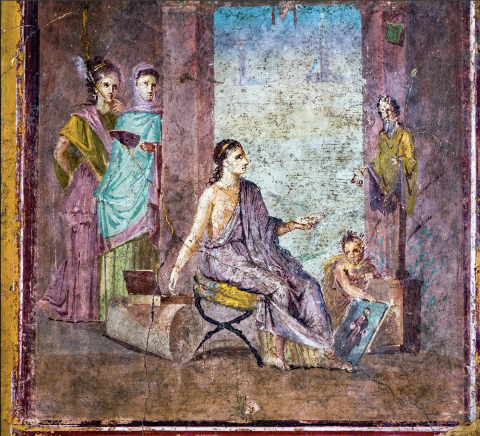Reema Habib and Joshua Nudell
July 9, 2024
Our eighth interview in the Contingent Faculty Series is a virtual conversation between Dr. Joshua Nudell and Dr. Reema Habib. The interviews in this series are designed to highlight the work and experiences of faculty whose positions are contingent, including adjuncts, visiting assistant professors, tenure-ineligible lecturers, and others on time-limited contracts.
Joshua Nudell: To start off, share with us how you got interested in the ancient world, and Mediterranean archaeology in particular. What led you to study this particular part of the world?
Reema Habib: My formal introduction to the field began as the result of a great conversation that I had with members of the Classical & Near Eastern Archaeology Department during Freshman Orientation week in college, but I doubt that it would have resonated as strongly had I not had a bit of an unusual upbringing.
My family is from Bangladesh, and I had been raised in the U.S. for the first 6 years of my life while my father finished grad school. We returned to Bangladesh when he completed his degree and, as I didn’t know the language at the time, my parents enrolled me in English-medium schools. This alone wasn’t unusual: not only did most well-educated people in the country speak English, but my father was a professor of Shakespeare (yes, in English) and my grandfather a professor of History. English was the lingua franca in our home, but trying to find children’s reading material in English ran into postcolonial problems. In the 1980s, Bangladesh was a poor country dependent on Western humanitarian aid, one aspect of which was the wholesale importation of outdated-but-serviceable books and textbooks. My textbooks were from 1960s Britain, which featured the Romans quite a bit, and my choices of children’s books were limited either to the literary classics, including the Iliad and the Odyssey, or to the entire run of the Asterix comic book series.
This isn’t to say that I was insulated from my own culture — I wasn’t, entirely — but to stress instead that the material I was given to study, and to value more as a building block for my future, was focused on the West. I never thought it was strange myself, since my school friends were reading the same things, but unlike them, I had a father whose preference for bedtime stories lay in simplified versions of the Bard’s plays. I grew up hearing all about Julius Caesar, Antony, Cleopatra, Theseus, and Hippolyta, and when we moved back to the States, the culture shock of reconciling my 1960s-centric understanding of the world to the 1990s-era reality of middle school led me to bury myself in familiar literature. Why read Sweet Valley High, which I didn’t connect with, when I could re-read the Odyssey and make cultural connections through the medium of antiquity? My peers in middle school didn’t always understand my references, but those differences failed to matter once the Indiana Jones movies began to hit the theaters. The ancient world became the path through which I was able to navigate a number of different cultures, and my appreciation for it finally found an outlet in the archaeology classes that I took in college.
JN: Your current position at Tennessee falls into a category of labor that is increasingly common at big universities: a full time employee on limited contracts and without the protections of tenure. How has it shaped your experience in the university, in terms either of opportunities or restrictions?
RH My position is 100% teaching, and as it’s a 4/4 load, the majority of my time is taken up by teaching, grading, or prep. Like most other contingent faculty without a research appointment, I am not officially given time to conduct my own research, and must find the time to do it when I can. Unofficially, however, I am very fortunate to work in a department with very understanding colleagues who do what they can to give me room to research, and who remind me frequently that University service is optional at my level. A timeline of this sort is admittedly slow going, but every contingent faculty member in my department is encouraged to continue their own work, and I don’t think that can be said for every department here or for every institution. In terms of opportunities and restrictions, I have felt that most service opportunities are open to contingent faculty at this institution, and most departments offer some form of compensation for the additional effort. Whether or not someone is able to take advantage of every opportunity is a key point in this conversation, as contingent faculty tend to teach more than our tenured colleagues, and therefore have less time to pursue both service opportunities and their own research.
JN: You’re also an archaeologist who teaches a wide range of topics, including beginning Latin. Has being contingent changed what or how you teach?
RH: Contingent faculty in my department generally do not teach upper division 400-level courses, but there don’t seem to be any unreasonable restrictions in the range of topics that we can teach. I personally have found it to be very refreshing to switch between archaeology and philology classes, and I think this sort of wide-ranging exposure results in a more nuanced understanding of the field as a whole. I have been pleasantly surprised by a Classics Research Practicum course that we offer to our sophomore and junior majors. I run the course a bit like a proseminar that explores different branches of research in the field, and it really helps the students to see how different subfields can add value to their own topical interests.
Being contingent has not changed how I teach, but it has changed how I view course prep and my course materials. I’m always aware that my job is not permanent, so I maintain a tighter grasp on my ownership of my course materials, lesson plans, and outreach activities in the event that I have to take my ideas somewhere else. I also try not to have more than one new prep per semester, and most of my requests to teach (or not teach) specific courses have been handled in good faith. That isn’t to say that I always get what I want — I don’t! My first few years at this institution saw me with multiple new preps every semester, which severely consumed my time, but I also assume that’s a common aspect of onboarding in academia.
JN: An ongoing conversation at a lot of institutions in recent years is how they can support faculty with child-care responsibility. You and your partner are both academics. How have you managed these challenges?
RH: I’m not sure I believe that child-care is ever without challenge, no matter how much help one might have. My husband and I are lucky that our department has tried to accommodate certain scheduling requirements for us. For example, our teaching schedules do not often overlap, so that one of us will always be available in the event of a child-related emergency. Contingency isn’t an overt factor in our familial decisions, but it is a mental load that I am aware of at all times. My husband and I always need to coordinate attending evening lectures so that someone can stay home with our child, for instance.
I’ve also become more aware of the limitations that contingent faculty are generally required to navigate with respect to family matters, even if those limitations do not currently affect my specific family unit. Contingent faculty do not always receive parental leave, for example, and new parents are left with the option of taking FMLA or an unpaid leave of absence, in which case their health insurance lapses. To get around this problem, many departments will try to work with contingent faculty to give them online courses or alternative assignments so that they can remain fully employed and therefore insured, but it seems strange to me that an issue of this caliber would need to be resolved at the individual level rather than at the institutional level. While the personal approach is effective, there remains a fundamental difference in the perinatal experiences of contingent and tenured faculty, the latter of whom are eligible for both parental leave and FMLA. Thankfully, at this institution, the Faculty Senate and the Union are both working to address issues of this sort, but it’s a long and slow redress of an issue that is unfortunately common to the contingent experience for many people.
JN: How do you think the field can or should adapt and evolve to better serve our students, colleagues, and community?
RH: I would hope that our field would advocate to open up more research opportunities to contingent faculty, particularly those opportunities that provide time as well as funding and a reasonable expectation of a position to come back to. Resources that exist within institutions to assist in research and publication efforts should also be made available to contingent faculty. The most important advice I could give to a graduate student is to say, “Join your union!” While contingent faculty are increasing in number across most campuses in the US, administrative benefits have not equalized or kept pace with the rising value of the work that we do, and it often falls to unions to force necessary corrections in policy and to do so in a timely fashion.
Authors



